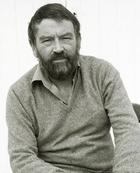
John Fowles was born in 1926 in Leigh-on-Sea, a small town in the county of Essex located about forty miles from London. He sums up his childhood in one sentence: "I've been trying to escape from it ever since." After finishing his studies at the Bedford School, he enrolled at the University of Edinburgh, where he specialized in French and German. In 1945 he began compulsory military service, but World War II ended shortly after he finished his military training, which for Fowles was fortunate since life in the army was not his thing, as he himself would be responsible for repeating in various occasions. The next four years were spent in Oxford, where he discovered French existentialism, a movement to which he would adhere immediately and which would excite him. In particular, he admired Camus and Sartre, whose ideas about the will of the individual corresponded to his. After obtaining a degree in 1950, he devoted himself fully to teaching, a profession he practiced in various places in the world, such as France, England or Greece. And it was precisely in Greece where he began to write in a more constant and professional way. As of 1963, and thanks to the success of his first novel, El coleccionista, he was able to devote himself to full-time literature. In 1968 he moved to Dorset, which would serve as the setting for the best known of his novels, The Woman of the French Lieutenant, whose text would later be adapted by Harold Pinter to turn it into the successful film starring Meryl Streep. El Mago, a work of cult in the United States, would also take to the big screen in 1968. In 1979, Fowles wrote his best-known essay, El árbol, a partially autobiographical book in which he narrates his relationship with art and creation , and that is also a plea in favor of the conservation of wild nature. Fowles died in his home in Dorset on November 5, 2005, after a long battle against a stroke suffered in 1988.




